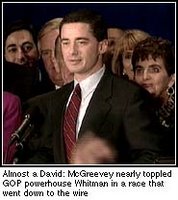My political education
 With the President equating the deaths and lives of hundreds of thousands to a comma and yet another chapter in the continuing reverse Roots saga of everyone's favorite senator, things look bad. It seems American politics is in the gutter, that personality triumphs policy, that our leaders are stupid, criminals, liars, crooks, and generally not admirable people. It seem like it has reached an all time low. Maybe it has, but then again, I was reminded this weekend it probably has always been like this. At least as long as I have known or cared about it.
With the President equating the deaths and lives of hundreds of thousands to a comma and yet another chapter in the continuing reverse Roots saga of everyone's favorite senator, things look bad. It seems American politics is in the gutter, that personality triumphs policy, that our leaders are stupid, criminals, liars, crooks, and generally not admirable people. It seem like it has reached an all time low. Maybe it has, but then again, I was reminded this weekend it probably has always been like this. At least as long as I have known or cared about it.
New York magazine's cover story this month is former New Jersey governor James McGreevey's "confession" for his hiring of his gay lover into a state job and the eventual scandal that ended his political career. Its a pretty sad and torrid story, and while McGreevey hurt alot of people, his family, his wife, his supporters, with his deception, it almost seems like he had no choice. The call to power was so strong he was willing to sacrifice everything for it and, as his telling makes clear, not just the truth of his sexual orientation, but his general morality and ethics.
In 1997, in his first run for the governorship against then Gov. Christine Todd Whitman, McGreevey nearly won, which in itself was a victory and lead to his landslide in 2001. That summer I was about to be a high school senior and with a drivers license for the first time. Excited, and thinking about college applications, I volunteered for the McGreevey campaign in Woodbridge, and somehow ended up as a "Policy department intern", which I think was a totally made up title to make me feel good about working for nothing. I realize now I had a naive view of how government and elections worked, one weaned on bad movies, history/civics classes, and my debate club.
Anyway, I don't remember much of what I did. I mostly filed newspaper clips, shocked to see most articles were written very similar to each other. It was as if there was some sort of "release" given to the "press" that most journalist just reworded and sent to their editors. The one thing I clearly remember though was calling hospitals to see if any children had died from neglect or abuse. There was a scandal involving the DYFS (a kind of HHS for NJ), and a large number of deaths caused by a combination of abuse and terrible government oversite and lack of funding. It was a campaign issue, and worried they weren't getting all the info, they asked the lowliest person in the office, me, to pretend I was a Rutgers student doing research and call hospitals to see if any kids died. In a sick way, they kind of were hoping there were more dead kids, so they could hammer Whitman for it. I did a really shitty job, I felt horrible about lying, and about the whole disgusting thing.
I kind of stopped coming a few days after that. I was accused of being a flaky teenager, and since it was easy to agree with that, I did. To this day, when I think about sitting there, with just a phone book, trying to find information numbers for hospitals, lying about who I was, and "hoping" to find kids died, I feel terrible. Even though I didn't come up with the idea and I was just 17 hoping to make a good impression, it just seems like I did something wrong. Reading McGreevey's apology today reminded me of all of this, and that feeling.
I can't be that mad at someone like McGreevey because he's been publicly humiliated and he has not just admitted he did wrong, he seems to know it. There really isn't much a point to this post. We all know the ideal of democracy, public policy, public service is far, far away from the actual work of politics: the electioneering, the marketing, the slogans, the soundbites. For me, that divide is too much and that's why I rather post this, here, anonymously, and maybe read by just you. Maybe its a weak excuse, but all that counts is our equal ability to evaluate freely available information to help choose our shared destiny, our obligation to do so based on what is right and what is wrong, and to argue openly with each other about those decisions. The politicians and the processes might all be horrible, but as long as we have that everything will be okay.
That and voting machines that actually work.
|